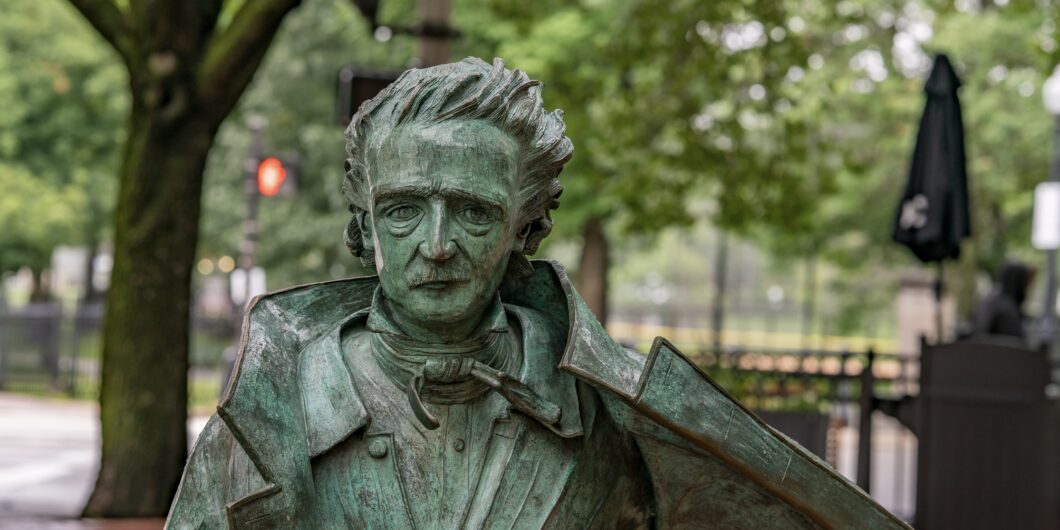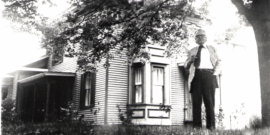If Kenneth Branagh wants to become Hercule Poirot, he must embrace the moral vision of the Queen of Crime.
Poe, Forevermore
Deep in the dark corners of any artist’s being, there is both myth and reality. The two are intertwined, creating new and different meanings. He himself has the potential to embrace either one or both at the same time, but after death comes for the artist, it is often the myth and the legend that remain alive, while the reality is forgotten and displaced.
Truth is often stranger and more horrific than fiction. The life of Edgar Allan Poe is one of those instances. Poe—the American writer who has left such an indelible mark and impact on American literature and culture; Poe—a child forgotten and abandoned; Poe—the master of horror stories; Poe—the sensitive, melancholic, and tormented alcoholic; Poe—the man who desired order rather than horror and chaos; and Poe—the man who appreciated humor.
There are many sides to Edgar Allan Poe that, unsurprisingly, go beyond the famous daguerreotype photograph of a mustached man, with penetrating eyes and ruffled dark hair. Along with the raven (based on one of his most famous poems, The Raven), that image of Poe is what everyone sees today. Poe is on coffee mugs, magnets, socks, notebooks. He remains popular with both people and scholars.
Beginning with silent cinema, every decade in cinematic history has seen the making of film adaptations of his stories, be it Universal Studios’ films with Bela Lugosi and Boris Karloff, Roger Corman’s Poe cycles, or, even more recently, Netflix’s The Fall of the House of Usher. Poe has captivated us in both his life and death. We cannot look away from his stories of terror because in them we see ourselves, our desires, our frailties. But who is Poe? Has he ever revealed himself? That dark image of Poe is only one small part of the man who gave us the tales of darkness.
A Bostonian in Virginia
Poe’s life is a mystery unto itself. In an autobiographical note, he stated that he was born in 1811, but this turns out to be untrue. In fact, Poe was born on January 19, 1809, in Boston. His parents, David Poe Jr. and Elizabeth (Eliza) Arnold Hopkins Poe, were both actors. Edgar was the second child, having an older brother, Henry, and a younger sister, Rosalie.
Tragedy seems to have followed young Edgar right from the beginning. Although both of his parents were very much active in the theater, it was Eliza, a beloved actress with a beautiful voice, who was admired and widely sought. David usually received bad reviews, often described as wooden and talentless. He abandoned his wife and three children in 1810 for reasons not exactly known. Young Edgar thus had no fatherly presence in his life, and was cared for by a carousel of people while his mother supported the family with her acting career. Not all of his caretakers were admirable; an elderly nurse, for instance, had a peculiar and nasty habit of plying the Poe children with gin and laudanum, just to ease her “pain” of taking care of them.
Poe was generally justified in his criticism, as becomes clear we look back on his book reviews. The writers he found to be mediocre have not stood the test of time.
Although David Poe Jr. did not die in Edgar’s presence, his abandonment was still a death of sorts. Tragedy struck again when Eliza became sick with tuberculosis, dying on December 8, 1811, at age 24. It is assumed that Poe’s father died three days after Eliza in Norfolk, Virginia, so the children were truly orphaned. Eliza’s death and his father’s abandonment were a sadness that followed Poe all his life. Years later, in a letter to a friend, he would write: “In speaking of my mother you have touched a string to which my heart fully responds. To have known her is to be an object of great interest in my eyes. … I have many occasional dealings with Adversity—but the want of parental affection has been the heaviest of my trials.”
About a week before Eliza died, Richmond’s Enquirer printed an announcement: “To the Humane Heart.”
On this night, Mrs. Poe, lingering on the bed of disease and surrounded by her children, asks your assistance and asks it perhaps for the last time. The Generosity of a Richmond Audience can need no other appeal.
The Poe children were separated and adopted into various families. For Edgar, that “Generosity” came from Frances “Fanny” Allan, who often helped Eliza while she was alive. Edgar was taken in by Fanny and her husband, John. (Edgar’s middle name comes from the Allan family.) Right from the beginning, Fanny gave Edgar plenty of affection, and somehow understood the boy’s inherent sensitivities. John, on the other hand, did not share her love for Edgar. In fact, he never officially adopted Edgar, and never considered him, even symbolically, a son. Years later, when John died, he provided for all of his children in his last will and testament, including the illegitimate ones. But he didn’t leave a penny for Edgar. Poe, on his side, remained salty with his foster father. In his adult letters to John, he would constantly ask for money while throwing in the occasional insult.
Whatever difficulties they had later in life, it is undeniable that Fanny’s early death and John’s rejection of Edgar as an adopted son had another depressing impact on Poe. Feelings of abandonment and the fear of being alone would prove to be Poe’s constant companions. Paradoxically, however, it is these fears that illuminated Poe’s essence as a man and as a writer. If he had become a “Gentleman of the Letters,” or “Lord Byron” (as he aspired to), and if he had all of the financial means he desired, perhaps he wouldn’t have written the horror stories for which he was known then and now.
“The Tomahawk Man”
Poe made his strongest mark on the American and European imagination, during his lifetime and beyond, with tales of horror. But that was not the only thing that occupied his mind. In fact, for most of his life, he worked as a magazine editor and critic, and unlike other writers of his time, he made a living solely from writing.
Because of that, he often oscillated between prosperity and destitution. But he never sacrificed the quality of his work. He demanded excellence from himself and others, and was a merciless and unapologetic critic of other writers. This earned him a nickname, “The Tomahawk Man.” Poe was generally justified in his criticism; however, as becomes clear when we look back on his book reviews, the writers he found to be mediocre have not stood the test of time.
The question of how he went missing and then ended up in a tavern in Baltimore, semiconscious, wearing what appeared to be someone else’s clothes, only to die a few days later in a hospital, has spawned many different theories.
At the time, a practice of “puffing” was common in the magazine and book industry. Reviewers were either paid or promised mutually positive reviews (“puffing” up the writer regardless of his talent), and Poe hated this with great passion. Sometimes, his intellectual integrity and passion for truth made him enemies, but he couldn’t care less. As Mark Dawidziak points out in his book, A Mystery of Mysteries: The Death and Life of Edgar Allan Poe, “Poe was taking his stand as a critic, demanding that American literature be nurtured and encouraged by being held to the highest possible standards.” He wanted to go beyond British literature and show the world that American literature is unique and has a rightful place in the literary tradition.
It is not entirely known what Poe’s political leanings were, but one thing we know is that he abhorred mixing political opinions with art. When American poet Henry Wadsworth Longfellow added an anti-slavery commentary to his work, Poe spoke out very firmly and aggressively against this choice of expression. This stance speaks to those of us who see that art has intrinsic value, as does beauty, and we should not bend it in any way to affirm certain political or ideological positions.
Masks of Madness and Horror
Edgar Allan Poe ushered in many different literary genres. Without C. Auguste Dupin (a detective in many of Poe’s stories), there would be no Sherlock Holmes. Without fantastical voyages and theories about the universe, there would be no Jules Verne. Both Arthur Conan Doyle and Jules Verne gave Poe credit for this.
He wrote many genres, partly because he needed money. Still, it was clear that he had a particular attraction to horror stories, the thing he is most known for, most greatly appreciated by regular readers, scholars, critics, and aspiring writers. What Poe brought into the horror genre is the complex relationship between natural and supernatural. It is the psychology of the human mind and its obsessions and madness that we find fascinating. We are forced to look in the mirror and reckon with the “mad man” within.
In Poe’s short story, “The Tell-Tale Heart,” we are faced with an unreliable narrator who is trying to convince us that he is not mad while describing a murder he committed. “True!—nervous—very dreadfully nervous I had been and am; but why will you say that I am mad? The disease has sharpened my senses—not destroyed—not dulled them. Above all was the sense of hearing acute. I heard all things in the heaven and in the earth. I heard many things in hell. How, then, am I mad? Hearken! and observe how healthily—how calmly I can tell you the whole story.”
Poe draws us in immediately, yet should we listen to the words of someone so irrational, so unstable? But we can’t look away. This isn’t a story about getting mired in specific events but about the complexity of the human mind and the salvation of the soul.
In “The Masque of the Red Death,” Poe shows us the inevitability of death. It entails Prince Prospero, who invites equally wealthy guests to his castle to avoid the “Red Death” (Poe is most likely referring to the cholera or tuberculosis epidemic). In an effort to pass the time, he hosts a masquerade ball, but there appears to be one guest who was not invited, masked as “The Red Death.” The prince cannot avoid the figure, however hard he tries, and he dies when confronted. His guests also die. The Grim Reaper will come, and we cannot play games. We are mortal.
The Mysterious Death
Any biographer will run into difficulties with the veracity of his or her subject’s life. Some things remain shrouded in mystery simply because we cannot know any person fully. Poe’s death is even more mysterious than his life. The question of how he went missing and then ended up in a tavern in Baltimore, semiconscious, wearing what appeared to be someone else’s clothes, only to die a few days later in a hospital, has spawned many different theories.
Following Poe’s death, the obituary written by his literary rival, Rufus Griswold, created an image of Poe as a scoundrel, an alcoholic, a mad and perverse man, much like his characters in stories. But this was never the case. Even Poe’s drinking habit was a problem only sporadically, though his on-again-off-again struggles with alcoholism did surely lead to more depression, anxiety, and a sense of deep personal failure. The obituary somewhat ruined Poe’s reputation, but many of his friends came forward and vociferously spoke out against the lies Griswold wrote.
Edgar Allan Poe—the man beyond the mysterious darkness we know him for—left an indelible mark on American literature. He was and is sui generis. It is thanks to his stories that we know that the macabre is closer to our souls than we think, and that the line between the natural and supernatural, rationality and madness, sacred and profane is often perilously thin, yet deeply human.



